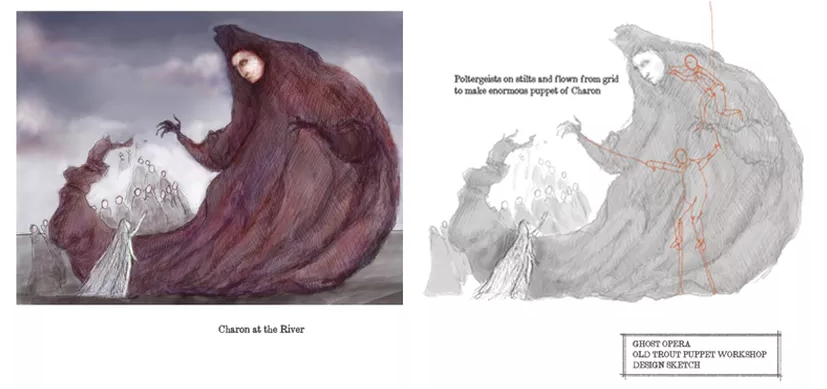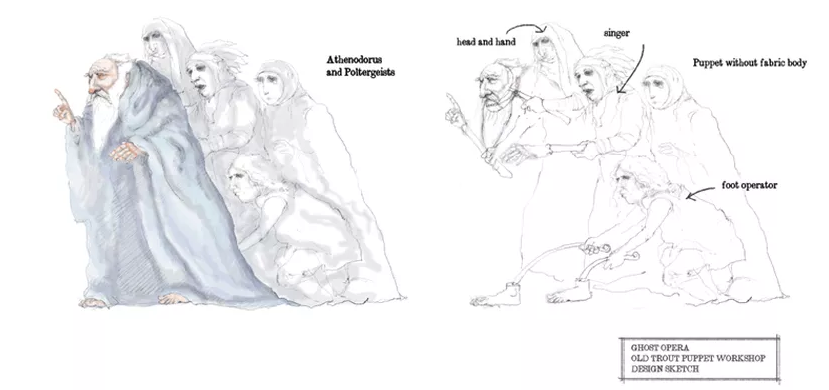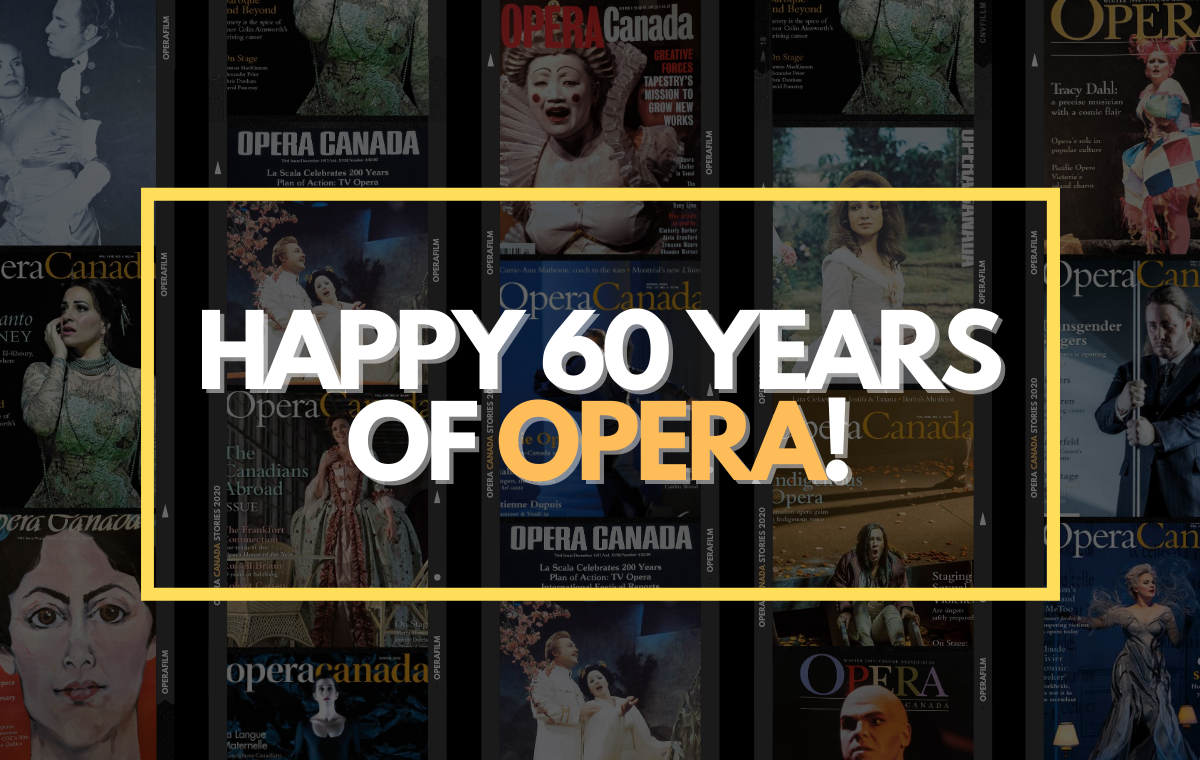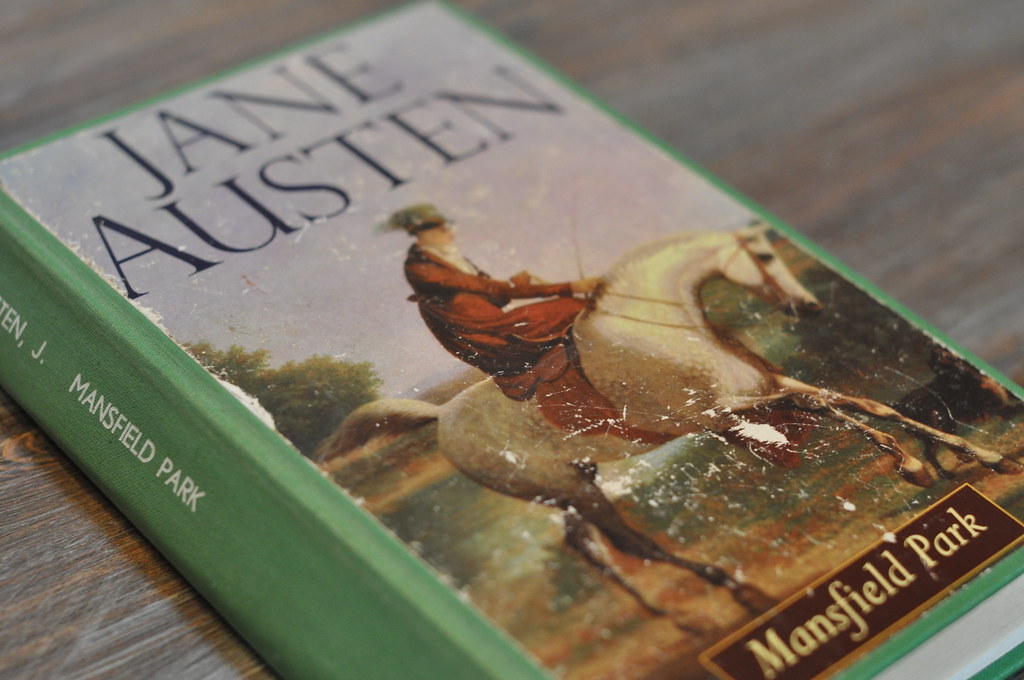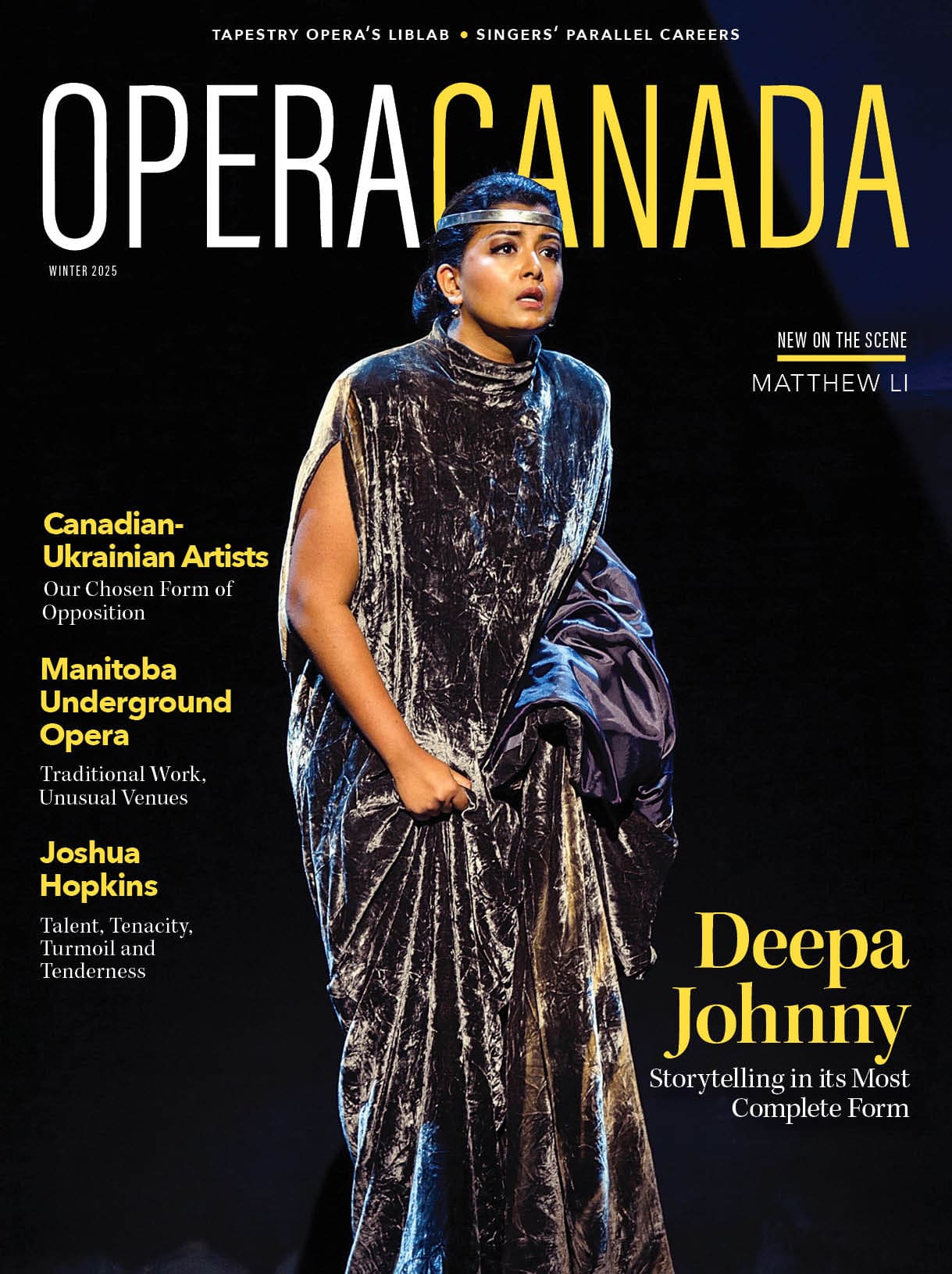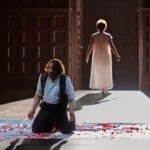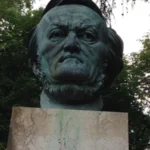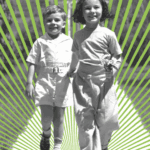There are a lot of people working on Ghost Opera–the May 24th world premiere is a collaboration between Calgary Opera, the Banff Centre for Arts and Creativity, and the Old Trout Puppet Workshop. That’s why the Greek concept Ananke is how Judd Palmer, co-founder of the Old Trouts, would sum up the behind-the-scenes magic of the production.
“It’s the [personification of] the way nothing ever turns out the way you think it will,” Palmer says. “What bringing this many people together accomplishes is that you just get a massive wad of Ananke. Things keep turning out differently than you thought, but better.” Palmer says puppets are physical manifestations of this concept. With surprises emerging at every turn (the Old Trouts were shocked to learn that singers need to look at the conductor at all times, despite being inside a puppet) the ethos of this production is ‘the more the merrier.’
Besides providing a label for the chaos of putting together a puppet opera, Greek language and mythology have been the bedrock of Ghost Opera. Palmer believes that award-winning author and librettist Andre Alexis conceived of this story while he was “mucking around in some musty research library somewhere [and] came across an ancient Greek ghost story that was the perfect thing to make an opera out of.” The reality is a touch less glamorous. Alexis and composer Veronika Krausas, long-time collaborators and comrades, were chatting on the phone one night. Alexis was curious about the world’s oldest ghost story. So he googled it. The inspiration he sought was in the footnote of a letter written by philosopher Pliny the Younger two thousand years ago.
Mythology–Greco-Roman and Trinidadian–has captivated Alexis since his father read stories to him before bed as a child. To Alexis, mythology is not abstract. It holds the sound of his father laughing. It is intrinsic to his own childhood. Memories, loss, and the concept of home play important roles in the story.
The premise of the libretto is that a philosopher buys a house with an eerily low price tag. Anyone who’s seen a horror movie knows what comes next. Surprise! The house is haunted and previous tenants have been driven to death or despair–neither are ideal options. But in this story, the ghost is the hero. If Ghost Opera is similar to Alexis’ Giller prize-winning novel Fifteen Dogs, the tropey concept will be the introduction to a nuanced, emotional ride. Plus, we can’t blame Pliny for the overdone tropes. After all, he was the first to use them.
For better or worse, the final product will land miles from its inception on Alexis’ desk in Toronto, literally and figuratively. “I’m going to be as surprised as anyone else on opening night,” he says. Krausas, who is Canadian but has created international buzz with her work for The Industry’s 2015 Hopscotch in Los Angeles, was a natural collaborator. But not without some of her own challenges. Krausas’ work is experimental, bold. She arrived with the mindset that this huge project with many moving parts would require her to relinquish some control over the score. That’s a difficult goal for any artist. “If something isn’t working it has to be changed and adjusted even if it’s musically brilliant,” Krausas says. In the same breath, she reminds me of the adage: ‘the most expensive thing besides war is producing an opera’.
As for Ghost Opera: “It’s more in line with what people would expect at an opera–except for the puppets–but the music itself isn’t very traditional,” Krausas says. “[For the final funeral procession] I was trying to imitate Palestrina, a 16th century composer, with his a capella, huge choral works. [But] it’s a bit of a mixed bag.”
To stage this mixed bag, Krausas called in the Old Trouts. For their operatic debut in 2016, the Trouts’ puppets were featured in Vancouver Opera’s Hansel and Gretel. Some elements of the nearly life-sized puppets used there will be similar in Ghost Opera, but others will be new. “We’re [always] trying a new idea so that eventually someday we’ll figure out how to do this properly,” Palmer says in his characteristic joking manner. “We never do the same thing twice.”
It’s only fitting because the Old Trouts’ origin is grounded in the unexpected. 20 years ago, four guys retreated to a ranch in Southern Alberta. They made puppets, collected eggs, fed pigs, and pondered the mortality of man. In the end, Y2K never happened but the Trouts did. And now they’re internationally celebrated.
“Puppetry had been relegated to the world of children…those are the people that continue to imagine and continue to delight in the impossible,” Palmer says. “As a culture, we’ve realized that doesn’t have to be something that we leave to children. The fantastical has seeped into the adult consciousness over the past 20 years.”
The combination of puppets and opera may seem outlandish now but there is a long tradition of marriage of the two, both in the East and West. Combining the slap-stick comedy of Punch and Judy, the elegance of 19th-century European marionettes, and the meticulous mechanics of Japanese Bunraku, the Old Trouts hope to create a performance that is both visceral and balletic. “A puppet is just theatre plus sculpture,” Palmer says. “We don’t have to be referencing the Muppets, we can be referencing Rodin or ancient Greek sculpture.”
To make this work, opera singers will not just be singing and acting in this production–as if that’s not enough. They will be part of the Ananke spirit, operating parts of puppets throughout the show and multitasking. Singer Adam Harris, playing Barrington the Pomeranian, sings his big cadenza while helping to make a puppet appear as if it’s being levitated by a poltergeist. Harris is not complaining: “I’ve never performed in a puppet opera before but now I only want to perform in puppet operas…I’m not sure if there’s a niche for that,” he says, half-jokingly. Joking is an important part of Ghost Opera.
Palmer says–perhaps also joking, but it’s impossible to tell: “You take sculpture plus theatre plus opera and put it all together–you’ve got everything on stage except for the cavalry. That’s the grand experiment of all; to fuse every possible human art form into one total work of art.” It’s a bold assertion but, if anyone can do it, my money’s on the Old Trouts.
Calgary Opera’s Ghost Opera will premiere on May 24 at Banff Centre.

